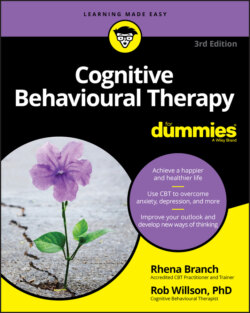Читать книгу Cognitive Behavioural Therapy For Dummies - Rob Willson - Страница 18
CONSIDER THE REACTIONS OF TEN PEOPLE
ОглавлениеDifferent people can attach different meanings to a specific situation, resulting in the potential for a vast array of emotional reactions to one situation. For example, consider ten basically similar people who experience the same event, which is having their partner treat them inconsiderately. Potentially, they can have ten (or maybe more) different emotional responses to precisely the same event, depending on how they think about the event:
Person 1 attaches the meaning ‘That idiot has no right to treat me badly – who the hell do they think they are’?, and feels angry.
Person 2 thinks, ‘This lack of consideration means that my partner doesn’t love me’, and feels depressed.
Person 3 believes that ‘This inconsideration must mean that my partner is cheating on me with someone else’, and feels jealous.
Person 4 thinks, ‘I don’t deserve to be treated poorly because I always do my best to be considerate to my partner’, and feels hurt.
Person 5 reckons the event means that ‘I must have done something serious to upset my partner for them to treat me like this’, and feels guilty.
Person 6 believes that ‘This inconsideration is a sign that my partner is losing interest in me’, and feels anxious.
Person 7 thinks, ‘Aha! Now I have a good enough reason to break up with my partner, which I’ve been wanting to do for ages’!, and feels happy.
Person 8 decides the event means that ‘My partner has done a bad thing by treating me in this way, and I’m not prepared to put up with it’, and feels annoyed.
Person 9 thinks, ‘I really wish my partner had been more considerate because we’re usually highly considerate of each other’, and feels disappointed.
Person 10 believes that ‘My partner must have found out something despicable about me to treat me in this way’, and feels ashamed.
You can see from this example that very different meanings can be assigned to the same event and in turn produce very different emotional responses. Some emotional responses are healthier than others; we discuss this matter in depth in Chapter 6.
If your answer to these questions is largely ‘yes’, then you probably are disturbing yourself needlessly about a negative event. The situation may well be negative, but your thinking is making it even worse. In Chapters 2 and 3, we guide you toward correcting disturbance-creating thinking and help you to feel appropriate distress instead.
